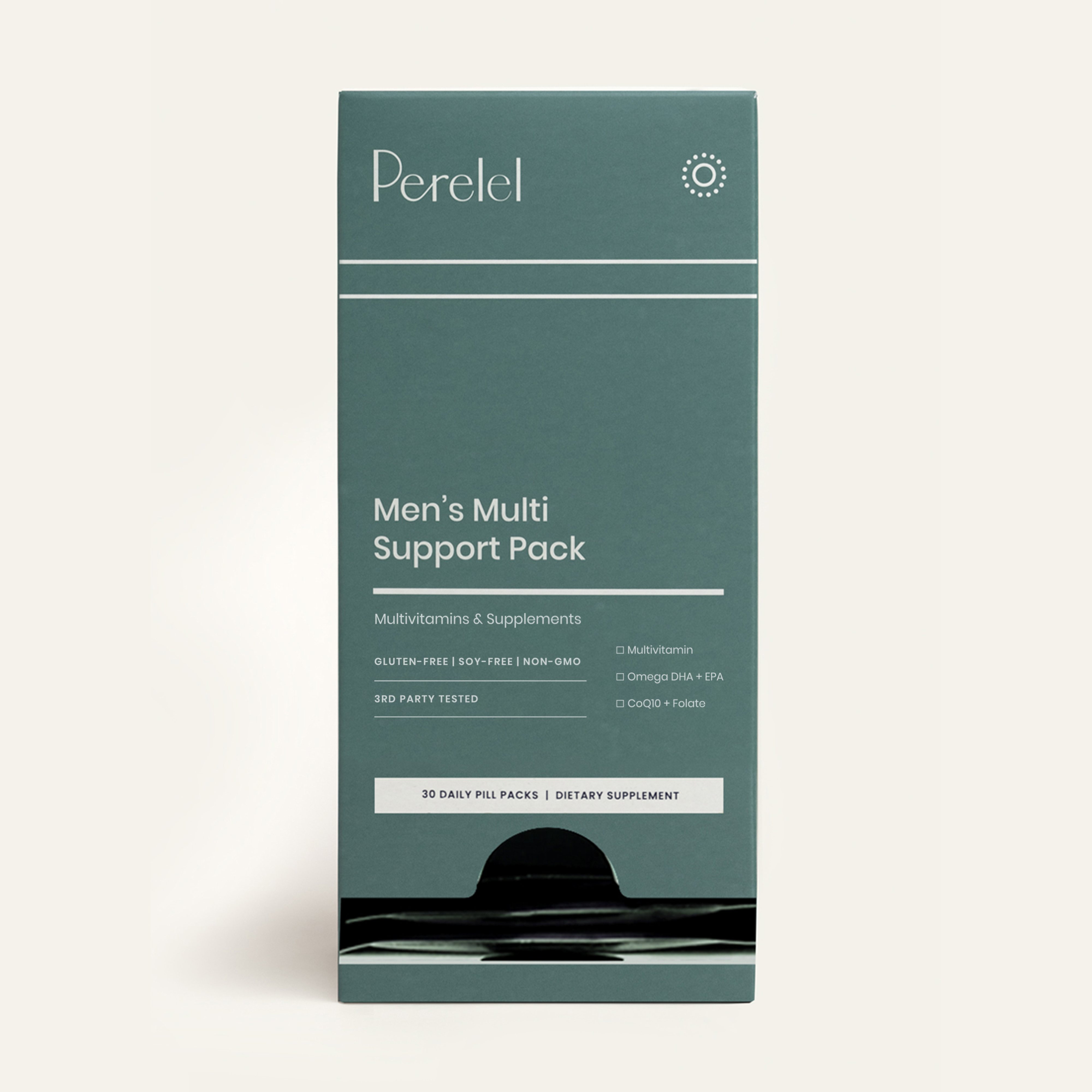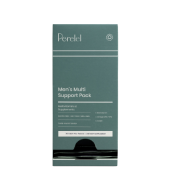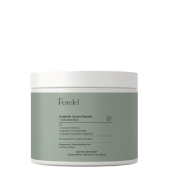Planning for a pregnancy in the near-ish future? Just making that decision is an exciting first step—and we know that it can usher in all kinds of questions. For example: What habits should I start now? When should I go off birth control? When should I start taking prenatal vitamins?
“The best time to start prepping your body for pregnancy is a year before your desired pregnancy,” says Banafsheh Bayati, MD, OB/GYN, FACOG. She describes the road to conception as a “journey of self-discovery”—an opportunity to zero in on healthier habits, get better acquainted with your body, and plan for this life-changing new chapter.
An important note:
Research shows that roughly half of all infertility cases are due to male factors like sperm health. Lifestyle factors like diet and supplementation are shown to impact male fertility just as much as they do women—it's why we formulated our Men's Multi Support Pack in partnership with leading fertility experts, with nutrients to support his general and reproductive health.
In a recent Perelel survey of nearly 1000 women who are currently TTC, we learned that while 92 percent of respondents take supplements to support their fertility, only 42 percent of their partners do the same—a gap that illustrates how much of the fertility burden tends to fall on women.
Let’s change that: By empowering you with the information both you and your partner need to support your fertility, you’ll be primed to tackle this new chapter together.
1 year before TTC
“12 months is a great runway for preconception,” says Perelel’s Dr. Caitlin O’Connor, ND. “This is the time to focus on the fundamentals for both partners.”
-
Prioritize a balanced diet.
“The importance of a nutrient-rich diet cannot be overstated,” says Dr. Bayati. Now is a good time for you (and your partner) to start assessing what’s on your plate—and perhaps more importantly, what isn’t.
Studies show that a diet rich in whole grains, unsaturated fats, vegetables, and fish is associated with more positive fertility outcomes. Certain nutrients, like folate, iron, and omega-3 fatty acids, are crucial for fertility and early pregnancy. In addition to emphasizing leafy greens and beans for folate, Dr. O’Connor recommends regularly “eating a rainbow” of vegetables—a helpful visual tool to prioritize phytonutrients.1,2
-
Start scaling back on alcohol, smoking, and other fertility-adverse habits. We all have our vices—but if we’re having an honest conversation about fertility, then we can’t ignore the research. Studies show a negative correlation between alcohol (ie 4+ drinks per week) and fertility for both men and women. The same goes for cigarettes: Smoking is shown to negatively affect hormone production, sperm concentration, and ovarian function.3,4,5
-
Practice stress management. Stress and our hormonal health are deeply intertwined—when our stress hormone, cortisol, is elevated, it can throw the whole system out of balance. (It’s why chronic stress can cause our periods to be irregular.)
“What you put into the body is what you get out of the body,” says Dr. Andy Huang, MD, FACOG, a leading reproductive endocrinologist. “And stress can negatively affect the body because it’s all connected.”
That means finding outlets for your mental health, sure—but it also means taking steps to minimize physical stress, like logging enough sleep. (For what it’s worth, research shows a direct correlation between sleep deprivation and reduced chances for conception.)6,7
-
Make a financial plan.
There’s no sugarcoating it: There’s a cost to becoming a parent. Even with insurance, the average healthcare costs associated with pregnancy and childbirth average almost $19,000, including $2,854 paid out-of-pocket. You’ll also want to consider expenses for after baby’s arrival, like diapers, groceries, food, and childcare.
If you need fertility support, this can require an extra layer of financial planning—especially since fertility treatments aren’t always covered by insurance. The average IVF cycle, for example, costs between $15,000 and $30,000.
Beyond doing what you can to pad your savings, it’s a good time to review your insurance coverage and potentially explore options for financial assistance if needed.

6 months before TTC
As your timeline inches closer, you’ll start taking more direct steps to optimize your fertility—and make a game plan with your provider. And those habits we just talked about? More crucial than ever.
“Sperm has a 3ish month lifespan, so sperm leaving the body today went into production 3 months ago,” notes Dr. O’Connor. “That 3-month window is really important.”
-
Start taking prenatal vitamins.
“Even with an excellent diet, it is still important to optimize minerals, such as iron, and vitamin levels prior to pregnancy,” says Dr. Bayati. “Starting three to six months before a desired pregnancy with a folate-based prenatal that contains adequate amounts of vitamin D and omega-3 DHA is best.”
Shop the Article:
It’s important to start building those nutrient stores now, because our demands increase immediately after getting pregnant. Folate, for example, helps with early neurodevelopment and the prevention of birth defects during the first few weeks of pregnancy—before you even know you’re pregnant.
Better yet, you’ll take prenatal vitamins formulated specifically to support pre-pregnancy. Perelel’s Conception Support Pack* includes essential prenatal nutrients to support early pregnancy (including additional folate), as well as nutrients like CoQ10 to support egg health and ovulation.* -
Get better acquainted with your menstrual cycle.
If you’re not tracking your cycle already, now is a great time to start. “It can take up to six months of tracking to really understand your cycle and its phases, so plan early and educate yourself,” says Dr. Bayati. An ovulation tracker app is an easy way to follow along.
Beyond learning what your “normal” is—that is, your cycle length, ovulation, and how your hormones ebb and flow throughout the month—your cycle is an important indicator that everything is running smoothly. For example, if your period is irregular, now is the time to check in with your provider to address any underlying issues.
-
Check in with your doctor.
“I️ highly recommend a preconception visit for both partners to address medications and supplements prior to attempting conception,” says Dr. Bayati. This is a good time to flag any irregularities with your cycle, underlying conditions, or noteworthy family history.
“You’ll also want to chat through any current meds you’re taking to see if they can have an impact on fertility, and make a plan wean or switch to an alternative if needed,” adds Dr. O’Connor. “I’d also do a baseline bloodwork to check for any imbalances that we want to address prior to pregnancy, ideally with a provider who understands nutrition and preconception.”
-
Make a plan to go off birth control.
This is something else to discuss with your provider, especially if you have an IUD or implant that will need removal. The timing of what this looks like is up to you and your provider: Some like to make a transition plan earlier, in order to get a more accurate read on their cycle (since hormonal birth control can mask symptoms). If you do so but aren’t quite ready to conceive, just remember to make plans for other forms of contraception—our experts contend that the “adjustment period” your body goes through after being on birth control is a bit of a myth, so your chances of conceiving even right after removal are still very real.
When you’re ready to start trying
First of all: How exciting! This is the time to lean into the process and have fun with it.
-
Find your fertile window.
These are the days during your menstrual cycle when you’re most fertile. “Your fertility window is highest in the 5 days leading up to ovulation, along with the day of ovulation and the day after,” says Dr. Bayati. In order to conceive, a sperm cell has to fertilize your mature egg within 12 to 24 hours of ovulation—but sperm can actually survive in the uterus for up to five days, hence the length of your fertile window.
There’s one caveat: Everyone’s cycle is different, and some ovulate earlier or later than others. “For some, increasing regular sexual activity following the completion of the menstrual cycle is sufficient,” says Dr. Bayati. But if you want to be more precise, there are signs and symptoms to look out for: Your cervical mucus, or discharge, is a tell-tale sign, as it tends to get stickier when we’re closer to ovulation. You might notice an increase in sex drive or a boost in mood. You might use tools like a basal body thermometer (our temperatures rise slightly during ovulation) or an ovulation kit, which tests for luteinizing hormone—the chemical that triggers ovulation.
-
Have sex during your fertile window.
During the days leading up to ovulation, aim to have sex every other day (or more frequently, if you prefer!). Again, the goal is that when you ovulate and the mature egg descends from the ovary to the fallopian tube, it meets a healthy sperm cell and is fertilized—resulting in a pregnancy.
In terms of logistics, Dr. O’Connor has just two pointers: “Use a fertility-friendly lube and have fun.” -
Know how to navigate the Two Week Wait (TWW).
The time between ovulation and your anticipated next period is known as the Two Week Wait—it can take about 14 days for the pregnancy hormone human chorionic gonadotropin (hCG) to register on a pregnancy test, so your first indication of a successfully fertilized egg is often a missed period.
The anticipation of this time can be tough, and you might be tempted to overanalyze every twinge and symptom. While there are symptoms related to implantation and early pregnancy, they’re not too different from PMS—so your best bet is to wait it out until you get final confirmation from a pregnancy test. In the meantime, take the time to prioritize your mental health, make plans with your friends and partner, and keep up with activities that help relieve stress.

If you’ve been trying for awhile
The unknowns of TTC can be a lot, but it is important to know that you’re not alone—many women find that the most surprising aspect of the whole babymaking journey is that it simply doesn’t happen overnight. In fact, the average conception rate each month for a young, healthy couple is anywhere from 20 to 30 percent.
“Patience is key, as it can take up to 12 months to conceive,” notes Dr. Bayati. “A positive attitude is called for—but having been through this process and working as an OB/GYN for over 20 years, I️ admit, this is easier said than done.”
There are a few signs that it might be time to seek out the support of a fertility specialist, according to Dr. Bayati:
- If you’ve been trying for over 12 months
- If you’re over the age of 35 and have been trying for 6 months
- If you’re not ovulating and/or struggling with irregular periods
The good news? 90 percent of infertility cases are treatable. We created our Fertility+ Support with two of the country's leading fertility doctors for those fertility journeys that may need extra support. If you meet the criteria above, or have an inflammatory condition like endometriosis or PCOS, you might benefit from adding it onto your existing routine alongside our Conception Support Pack.*
A note on the age factor
“Geriatric pregnancy.” “Advanced maternal age.” “Fertility Cliff.”
The age of 35 has historically been presented as a daunting fertility threshold. But while age is certainly a factor in fertility, the idea of a “Fertility Cliff” at age 35 is a bit of a myth—it’s more like a gentle slope.
In fact, one of the largest studies ever conducted on age and fertility found that:
- 84 percent of women under the age of 35 will conceive within a year
- 78 percent of women from age 35 to 40 will conceive within a year
The bottom line: Every journey to parenthood is different and full of its own twists and turns. We can’t completely take the guesswork out of the experience, but we can empower ourselves with more literacy to navigate this chapter.
References:
- Panth N, Gavarkovs A, Tamez M, Mattei J. The Influence of Diet on Fertility and the Implications for Public Health Nutrition in the United States. Front Public Health. 2018 Jul 31;6:211. doi: 10.3389/fpubh.2018.00211. PMID: 30109221; PMCID: PMC6079277.
- Skoracka K, Ratajczak AE, Rychter AM, Dobrowolska A, Krela-Kaźmierczak I. Female Fertility and the Nutritional Approach: The Most Essential Aspects. Adv Nutr. 2021 Dec 1;12(6):2372-2386. doi: 10.1093/advances/nmab068. PMID: 34139003; PMCID: PMC8634384.
3. He S, Wan L. Associations between smoking status and infertility: a cross-sectional analysis among USA women aged 18-45 years. Front Endocrinol (Lausanne). 2023 Apr 19;14:1140739. doi: 10.3389/fendo.2023.1140739. PMID: 37181041; PMCID: PMC10168125.
4. Rooney KL, Domar AD. The relationship between stress and infertility. Dialogues Clin Neurosci. 2018 Mar;20(1):41-47. doi: 10.31887/DCNS.2018.20.1/klrooney. PMID: 29946210; PMCID: PMC6016043.
5. Ilacqua A, Izzo G, Emerenziani GP, Baldari C, Aversa A. Lifestyle and fertility: the influence of stress and quality of life on male fertility. Reprod Biol Endocrinol. 2018 Nov 26;16(1):115. doi: 10.1186/s12958-018-0436-9. PMID: 30474562; PMCID: PMC6260894.
6. Bae, J., Park, S. & Kwon, JW. Factors associated with menstrual cycle irregularity and menopause. BMC Women's Health 18, 36 (2018). https://doi.org/10.1186/s12905-018-0528-x
7. Lateef OM, Akintubosun MO. Sleep and Reproductive Health. J Circadian Rhythms. 2020 Mar 23;18:1. doi: 10.5334/jcr.190. PMID: 32256630; PMCID: PMC7101004.
This article is for informational purposes only. It is not, nor is it intended to be, a substitute for professional medical advice, diagnosis, or treatment and we recommend that you always consult with your healthcare provider. To the extent that this article features the advice of physicians or medical practitioners, the views expressed are the views of the cited expert and do not necessarily represent the views of Perelel.























